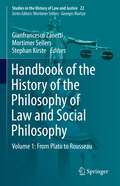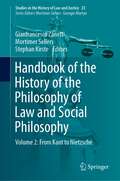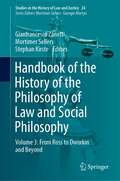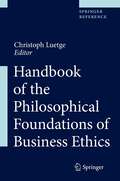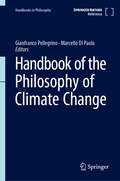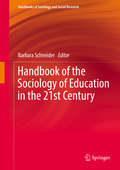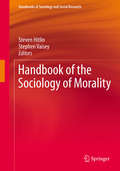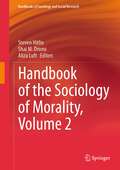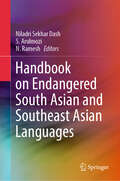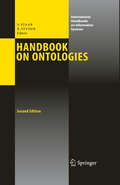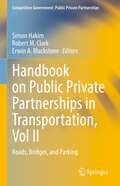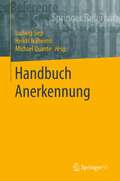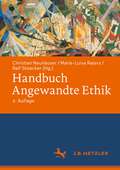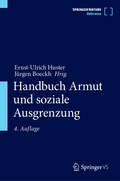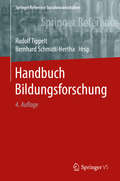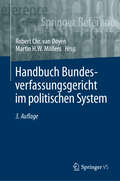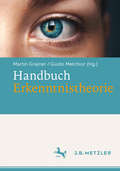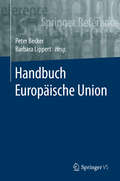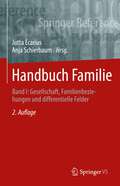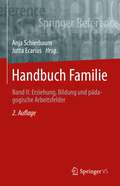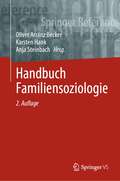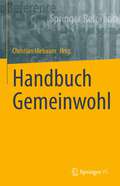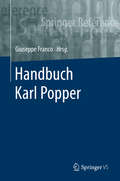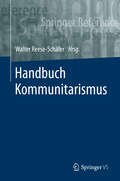- Table View
- List View
Handbook of the History and Philosophy of Mathematical Practice
by Bharath SriramanThe purpose of this unique handbook is to examine the transformation of the philosophy of mathematics from its origins in the history of mathematical practice to the present. It aims to synthesize what is known and what has unfolded so far, as well as to explore directions in which the study of the philosophy of mathematics, as evident in increasingly diverse mathematical practices, is headed. Each section offers insights into the origins, debates, methodologies, and newer perspectives that characterize the discipline today. Contributions are written by scholars from mathematics, history, and philosophy – as well as other disciplines that have contributed to the richness of perspectives abundant in the study of philosophy today – who describe various mathematical practices throughout different time periods and contrast them with the development of philosophy. Editorial Advisory Board Andrew Aberdein, Florida Institute ofTechnology, USA Jody Azzouni, Tufts University, USA Otávio Bueno, University of Miami, USA William Byers, Concordia University, Canada Carlo Cellucci, Sapienza University of Rome, Italy Chandler Davis, University of Toronto, Canada (1926-2022) Paul Ernest, University of Exeter, UK Michele Friend, George Washington University, USA Reuben Hersh, University of New Mexico, USA (1927-2020) Kyeong-Hwa Lee, Seoul National University, South Korea Yuri Manin, Max Planck Institute for Mathematics, Germany (1937-2023) Athanase Papadopoulos, University of Strasbourg, France Ulf Persson, Chalmers University of Technology, Sweden John Stillwell, University of San Francisco, USA David Tall, University of Warwick, UKThis book with its exciting depth and breadth, illuminates us about the history, practice, and the very language of our subject; about the role of abstraction, ofproof and manners of proof; about the interplay of fundamental intuitions; about algebraic thought in contrast to geometric thought. The richness of mathematics and the philosophy encompassing it is splendidly exhibited over the wide range of time these volumes cover---from deep platonic and neoplatonic influences to the most current experimental approaches. Enriched, as well, with vivid biographies and brilliant personal essays written by (and about) people who play an important role in our tradition, this extraordinary collection of essays is fittingly dedicated to the memory of Chandler Davis, Reuben Hersh, and Yuri Manin.---Barry Mazur, Gerhard Gade University Professor, Harvard UniversityThis encyclopedic Handbook will be a treat for all those interested in the history and philosophy of mathematics. Whether one is interested in individuals (from Pythagoras through Newton and Leibniz to Grothendieck), fields (geometry, algebra, number theory, logic, probability, analysis), viewpoints (from Platonism to Intuitionism), or methods (proof, experiment, computer assistance), the reader will find a multitude of chapters that inform and fascinate.---John Stillwell, Emeritus Professor of Mathematics, University of San Francisco; Recipient of the 2005 Chauvenet PrizeDedicating a volume to the memory of three mathematicians – Chandler Davis, Reuben Hersh, and Yuri Manin –, who went out of their way to show to a broader audience that mathematics is more than what they might think, is an excellent initiative. Gathering authors coming from many different backgrounds but who are very strict about the essays they write was successfully achieved by the editor-in-chief. The result: a great source of potential inspiration!---Jean-Pierre Bourguignon; Nicolaas Kuiper Honorary Professor at the Institut des Hautes Études Scientifiques
Handbook of the History of the Philosophy of Law and Social Philosophy: Volume 1: From Plato to Rousseau (Studies in the History of Law and Justice #22)
by Mortimer Sellers Stephan Kirste Gianfrancesco ZanettiThis Handbook discusses representative philosophers in the history of the philosophy of law and social philosophy, giving clear concise expert definitions and explanations of key personalities and their ideas. It provides an essential reference for experts and newcomers alike.
Handbook of the History of the Philosophy of Law and Social Philosophy: Volume 2: From Kant to Nietzsche (Studies in the History of Law and Justice #23)
by Mortimer Sellers Stephan Kirste Gianfrancesco ZanettiThis Handbook discusses representative philosophers in the history of the philosophy of law and social philosophy, giving clear concise expert definitions and explanations of key personalities and their ideas. It provides an essential reference for experts and newcomers alike.
Handbook of the History of the Philosophy of Law and Social Philosophy: Volume 3: From Ross to Dworkin and Beyond (Studies in the History of Law and Justice #24)
by Mortimer Sellers Stephan Kirste Gianfrancesco ZanettiThis Handbook discusses representative philosophers in the history of the philosophy of law and social philosophy, giving clear concise expert definitions and explanations of key personalities and their ideas. It provides an essential reference for experts and newcomers alike.
Handbook of the Philosophical Foundations of Business Ethics
by Christoph LuetgeThe Handbook of Business Ethics: Philosophical Foundations is a standard interdisciplinary reference handbook in the field of business ethics. Articles by notable philosophers and economists examine fundamental concepts, theories and questions of business ethics: Are morality and self-interest compatible? What is meant by a just price? What did the Scholastic philosophers think about business? The handbook will cover the entire philosophical basis of business ethics. Articles range from historical positions such as Aristotelianism, Kantianism and Marxism to systematic issues like justice, religious issues, rights and globalisation or gender. The book is intended as a reference work for academics, students (esp. graduate), and professionals.
Handbook of the Philosophy of Climate Change (Handbooks in Philosophy)
by Marcello Di Paola Gianfranco PellegrinoThis Handbook offers a broad yet unified treatment of many philosophical issues connected with climate change, ranging from foundational puzzles to detailed applications. It extends to many branches of philosophy that are relevant to the understanding of the premises and implications of the impacts of climate change on human and nonhuman life on Earth. More specifically, the handbook examines the scientific accounts of climate change as well as its causes. It explores the tools offered by social sciences and humanities to study the societal premises and impacts of climate change as well as delving deeper into the ethical and political issues connected with and resulting from climate change. By doing so, it puts it all in an ecological and historical context. In addition, the book offers solutions to some important philosophical puzzles and problems, and indicates paths of interaction between philosophy and other disciplines. The discussion about climate change and the mitigation/adaptation policies spans many areas and levels – from abstract science and philosophy to current on-the-ground politics. However, climate change is also a great a philosophical puzzle. Indeed, its existential and practical relevance can be thought to largely derive from the philosophical complications it engenders. Climate change is applied philosophy par excellence. Preventing dangerous anthropogenic climate change needs very good philosophy applied to concrete and specific practical issues. Climate change is an area where scholars from very different provenances should cooperate on equal terms, having in view a common, and really important, purpose – contribute to preventing great burdens and even the extinction of humankind and the destruction of hospitable and valuable non-human nature.
Handbook of the Sociology of Education in the 21st Century (Handbooks Of Sociology And Social Research Ser.)
by Barbara SchneiderThis handbook unifies access and opportunity, two key concepts of sociology of education, throughout its 25 chapters. It explores today’s populations rarely noticed, such as undocumented students, first generation college students, and LGBTQs; and emphasizing the intersectionality of gender, race, ethnicity and social class. Sociologists often center their work on the sources and consequences of inequality. This handbook, while reviewing many of these explanations, takes a different approach, concentrating instead on what needs to be accomplished to reduce inequality. A special section is devoted to new methodological work for studying social systems, including network analyses and school and teacher effects. Additionally, the book explores the changing landscape of higher education institutions, their respective populations, and how labor market opportunities are enhanced or impeded by differing postsecondary education pathways. Written by leading sociologists and rising stars in the field, each of the chapters is embedded in theory, but contemporary and futuristic in its implications. This Handbook serves as a blueprint for identifying new work for sociologists of education and other scholars and policymakers trying to understand many of the problems of inequality in education and what is needed to address them.
Handbook of the Sociology of Morality
by Stephen Vaisey Steven HitlinHuman beings necessarily understand their social worlds in moral terms, orienting their lives, relationships, and activities around socially-produced notions of right and wrong. Morality is sociologically understood as more than simply helping or harming others; it encompasses any way that individuals form understandings of what behaviors are better than others, what goals are most laudable, and what "proper" people believe, feel, and do. Morality involves the explicit and implicit sets of rules and shared understandings that keep human social groups intact. Morality includes both the "shoulds" and "should nots" of human activity, its proactive and inhibitive elements. At one time, sociologists were centrally concerned with morality, issues like social cohesion, values, the goals and norms that structure society, and the ways individuals get socialized to reproduce those concerns. In the last half-century, however, explicit interest in these topics has waned, and modern sociology has become uninterested in these matters and morality has become marginalized within the discipline. But a resurgence in the topic is happening in related disciplines - psychology, neurology, philosophy, and anthropology - and in the wider national discourse. Sociology has much to offer, but is not fully engaged in this conversation. Many scholars work on areas that would fall under the umbrella of a sociology of morality but do not self-identify in such a manner, nor orient their efforts toward conceptualizing what we know, and should know, along these dimensions. The Handbook of the Sociology of Morality fills a niche within sociology making explicit the shared concerns of scholars across the disciplines as they relate to an often-overlooked dimension of human social life. It is unique in social science as it would be the first systematic compilation of the wider social structural, cultural, cross-national, organizational, and interactional dimension of human moral (understood broadly) thought, feeling, and behavior.
Handbook of the Sociology of Morality, Volume 2 (Handbooks of Sociology and Social Research)
by Steven Hitlin Shai M. Dromi Aliza LuftThis handbook articulates how sociology can re-engage its roots as the scientific study of human moral systems, actions, and interpretation. This second volume builds on the successful original volume published in 2010, which contributed to the initiation of a new section of the American Sociological Association (ASA), thus growing the field. This volume takes sociology back to its roots over a century ago, when morality was a central topic of work and governance. It engages scholars from across subfields in sociology, representing each section of the ASA, who each contribute a chapter on how their subfield connects to research on morality. This reference work appeals to broader readership than was envisaged for the first volume, as the relationship between sociology as a discipline and its origins in questions of morality is further renewed. The volume editors focus on three areas: the current state of the sociology of morality across a range of sociological subfields; taking a new look at some of the issues discussed in the first handbook, which are now relevant in sometimes completely new contexts; and reflecting on where the sociology of morality should go next. This is a must-read reference for students and scholars interested in topics of morality, ethics, altruism, religion, and spirituality from across the social science.
Handbook on Endangered South Asian and Southeast Asian Languages
by Niladri Sekhar Dash S. Arulmozi N. RameshThe handbook delves into the linguistic features of Southeast Asian and South Asian endangered languages, providing detailed descriptions and analyses. Each chapter covers a range of topics, including linguistic properties, extralinguistic aspects, and issues related to preserving and promoting endangered languages. The book also includes an ethnolinguistic profile for each language, discussing its official status, state of endangerment, demography, and usage. It discusses the methodological issues related to collecting and analyzing linguistic data. Furthermore, the book describes the unique linguistic features of each language, covering phonology, morphology, morphosyntax, and other linguistic aspects. By doing so, the book highlights how new linguistic features and findings can reflect on the community. Given the context of UNESCO's declaration of the 'International Decade of Indigenous Languages 2022-2032', this book offers valuable insights for students, researchers, policymakers, government agencies, educators, and linguists. It is an informative volume for scholars working on various endangered languages worldwide.
Handbook on Ontologies
by Rudi Studer Steffen StaabAn ontology is a formal description of concepts and relationships that can exist for a community of human and/or machine agents. The notion of ontologies is crucial for the purpose of enabling knowledge sharing and reuse. The Handbook on Ontologies provides a comprehensive overview of the current status and future prospectives of the field of ontologies considering ontology languages, ontology engineering methods, example ontologies, infrastructures and technologies for ontologies, and how to bring this all into ontology-based infrastructures and applications that are among the best of their kind. The field of ontologies has tremendously developed and grown in the five years since the first edition of the "Handbook on Ontologies". Therefore, its revision includes 21 completely new chapters as well as a major re-working of 15 chapters transferred to this second edition.
Handbook on Public Private Partnerships in Transportation, Vol II: Roads, Bridges, and Parking (Competitive Government: Public Private Partnerships)
by Erwin A. Blackstone Simon Hakim Robert M. ClarkSecond in a two-volume set, this book discusses the role of public-private partnerships (PPPs) in global transportation infrastructure, specifically focusing on roads, bridges, and parking. To provide vital services in an era of shrinking government budgets, public-private partnerships have become an increasingly important part of travel infrastructure worldwide. This book describes and analyses the structure of various models of PPPs in several countries, evaluating their effectiveness, and drawing policy implications for future use. The chapters were written by leading international researchers and practitioners in the transportation field where each chapter is a case study on the adoption, implementation, and outcome of transportation services. Taken together, these diverse case studies provide an integrated framework for evaluating, using PPPs, and suggesting policy implications to both the public and the private sectors in transportation. Providing rigorous empirical analysis of PPPs in transportation, this volume will be of interest to researchers in public administration, political science, public choice, and economics as well as practitioners and policymakers involved in establishing and monitoring PPPs in transportation.
Handbuch Anerkennung
by Ludwig Siep Michael Quante Heikki IkäheimoAnerkennung ist ein grundlegender Begriff der politischen und der Sozialphilosophie. Er ist geeignet, eine systematische Alternative zum individualistischen Paradigma zu bieten, ohne die Freiheitspotentiale der Moderne preisgeben zu müssen. In diesem Handbuch wird diese, bis in den Deutschen Idealismus zurückreichende Tradition erstmals begrifflich und philosophisch systematisch analysiert. Zugleich wird ihre mittlerweile erreichte ideen- und problemgeschichtliche Vielfalt durch ihre wichtigsten Autoren anschaulich präsentiert.
Handbuch Angewandte Ethik
by Christian Neuhäuser Marie-Luise Raters Ralf StoeckerAufgabe der Angewandten Ethik ist es, in privaten und öffentlichen Problemlagen konkrete Hilfestellung für eine ausgewogene Beurteilung der Situation und das moralisch richtige Verhalten zu geben. Dieses Handbuch lokalisiert die Angewandte Ethik systematisch und interdisziplinär und gibt einen Überblick über die zentralen Bereichsethiken. Zudem erläutert es Begriffe, die für alle Anwendungsfelder relevant sind (z.B. Personalität, Verantwortung, moralische Dilemmata). Der Hauptteil widmet sich ethischen Einzelthemen aus verschiedenen Bereichen: dem Privatleben des Menschen (z.B. Liebe und Freundschaft, Behinderung, Sexualität und Geschlechtlichkeit), dem Sozialleben und der staatlichen Ordnung (z.B. Grund- und Menschenrechte, Strafe und Strafvollzug, Rassismus und Sexismus, Interkulturelles Zusammenleben, Armut und Hunger), der medizinischen Ethik (z.B. Ethik der Pflege, Forschung am Menschen, Gentherapie, Intensivmedizin, Kosmetische Chirurgie und Enhancement) sowie der Umwelt- und Tierethik. Für die 2. Auflage wurde das Handbuch durchgesehen, umfassend aktualisiert und um mehrere Beiträge (u.a. Finanzethik, Philosophische Praxis, Flucht und Migration, Altern, Ethik der Stammzellforschung) sowie ein neues Kapitel über „Ethische Fragen der Digitalisierung“ erweitert.
Handbuch Armut und soziale Ausgrenzung
by Ernst-Ulrich Huster Jürgen BoeckhDas Handbuch präsentiert den „state of the art“ zu den Themen Armut und soziale Ausgrenzung. Beides nimmt in unserer Gesellschaft, in Europa und weltweit zu. Dies betrifft nicht nur die materielle Versorgung und Verteilung, sondern bezieht weitere soziale, ökonomische und politische Aspekte ein. In der mittlerweile 4. Auflage greift das Handbuch diese multifaktoriellen Zusammenhänge auf und fügt zentrale Erkenntnisse von Theorie und sozialer Praxis zusammen. Es zeichnet sich durch einen interdisziplinären Zugang aus, in dem sich eine Vielzahl human-, geistes- und sozialwissenschaftlicher Perspektiven bündeln. So werden u.a. wirtschaftliche Zusammenhänge, sozialethische Bewertungsmaßstäbe, juristische und verwaltungsmäßige Bearbeitungsformen, Bewältigung in und durch motopädagogische und ästhetische, bzw. medienpädagogische Praxis, geschichtliche Erfahrungen von und im Umgang mit Armut, soziale Beteiligungsstrukturen und individuelle Problemlösungskapazitäten dargestellt.
Handbuch Bildungsforschung
by Rudolf Tippelt Bernhard Schmidt-HerthaDas Handbuch Bildungsforschung repräsentiert Stand und Entwicklung der Bildungsforschung - ein national wie international stark gewachsener Forschungsbereich. Unter Berücksichtigung des interdisziplinären Charakters der Bildungsforschung wird ein systematischer Überblick über die wesentlichen Perspektiven, theoretischen Zugänge und Forschungsergebnisse gegeben, der auch aktuelle Entwicklungen und Themen berücksichtigt. Das Handbuch integriert aktuelle und grundlegende Erkenntnisse der beteiligten Disziplinen Psychologie, Soziologie, Fachdidaktik, Politikwissenschaft, Ökonomie, Philosophie und Geschichte, wobei die Erziehungswissenschaft/Pädagogik als zentrale Bezugsdisziplin verstanden wird. In die überarbeitete Auflage wurden die Aspekte der Grundbildung, des informellen Lernens, der Professions- und Übergangsforschung sowie die Perspektive einer organisationspädagogischen Lehr-Lernforschung einbezogen.
Handbuch Bundesverfassungsgericht im politischen System
by Robert Chr. van Ooyen Martin H. W. MöllersDas politikwissenschaftliche Standardwerk unterzieht Stellung und Funktion des Bundesverfassungsgerichts im Spannungsfeld von Politik und Recht einer umfassenden sozial- und rechtswissenschaftlichen Analyse. Vollständig überarbeitet und aktualisiert bietet die dritte Auflage fundierte Einblicke in den politischen Prozess und die (rechts-)politischen Implikationen der Verfassungsrechtsprechung. Dabei werden theoretische Grundfragen der Verfassungsgerichtsbarkeit, methodische Zugänge der Analyse, vergleichende Bezüge,historische Entwicklungen und Konfliktlinien miteinbezogen. Die dritte Auflage beinhaltet 70 Beiträge und ist als Reference-Handbuch konzipiert.
Handbuch Erkenntnistheorie
by Martin Grajner Guido MelchiorDie Erkenntnistheorie zählt zu den wichtigsten Teildisziplinen der theoretischen Philosophie. Seit 2000 hat sich die Disziplin sehr stark entwickelt. In diesem Zeitraum wurden in der Forschungsliteratur viele neue Antworten auf klassische erkenntnistheoretischen Fragen hervorgebracht und auch gänzlich neue Fragen und Probleme behandelt. Das Handbuch liefert einen Überblick über die aktuelle Entwicklung der Disziplin.
Handbuch Europäische Union
by Peter Becker Barbara LippertIn diesem Handbuch wird das grundlegende Wissen über die Europäische Union auf dem aktuellen Stand der Forschung präsentiert. Ausgewiesene Expertinnen und Experten befassen sich in den rund vierzig Einzelbeiträgen mit der Entstehungsgeschichte, den Institutionen und Akteuren sowie den wichtigsten Politikbereichen und Zukunftsfragen der EU. Die Darstellungen gehen von den normativen, vertragsrechtlichen Grundlagen aus, geben Einblicke in die politische Praxis und greifen problemorientiert Kontroversen in Politik und Wissenschaft auf.
Handbuch Familie: Band I: Gesellschaft, Familienbeziehungen und differentielle Felder
by Jutta Ecarius Anja SchierbaumDas Handbuch Familie in der überarbeiteten, aktualisierten und erweiterten 2. Auflage repräsentiert den theoretischen und empirischen Stand der Familienforschung aus interdisziplinärer Sicht. Mit dem Schwerpunkt auf Gesellschaft und differentielle Felder werden besondere Konstellationen von Familie und Familienbeziehungen in einem vollständigen Überblick beschrieben und dargestellt. In der neu strukturierten, überarbeiteten und erweiterten Auflage wird ein umfassendes Bild von Familie als Beziehungs- und Lebensform gezeichnet, in das die aktuellen wissenschaftlichen Erkenntnisse und Forschungsergebnisse einfließen.
Handbuch Familie: Band II: Erziehung, Bildung und pädagogische Arbeitsfelder (Springer Reference Sozialwissenschaften Ser.)
by Jutta Ecarius Anja SchierbaumDas Handbuch Familie repräsentiert den theoretischen und empirischen Stand der Familienforschung aus interdisziplinärer Sicht. Mit dem Schwerpunkt auf Kinder und Erziehung, Bildungsinstitutionen, Kindeswohl und (sozial-)pädagogische Arbeitsfelder wird die gesamte Breite der Thematik in einem vollständigen Überblick beschrieben und dargestellt. In der neu strukturierten Auflage wird ein umfassendes Bild von Familie als einer pädagogischen Institution gezeichnet, in das die aktuellen wissenschaftlichen Erkenntnisse und Forschungsergebnisse einfließen.
Handbuch Familiensoziologie
by Karsten Hank Anja Steinbach Oliver Arránz BeckerDieser Band bietet einen umfassenden Einblick in die große thematische Breite und Tiefe der familiensoziologischen Forschung. Dabei geht es um die Konstanten und Differenzierungen des familialen Lebens in den verschiedensten Regionen der Welt sowie die unterschiedlichen methodischen und theoretischen Ansatzpunkte in der Familienforschung. Schließlich wird eine Vielzahl familialer und sozialstruktureller Fragestellungen einschließlich ihrer empirischen Fundierung aufgegriffen, referiert und kritisch kommentiert. Heiratsmarkt, Fertilität, Arbeitsteilung, Generationenbeziehungen, Trennung, Bildung, Mobilität, Familienpolitik und -recht sind nur einige Beispiele für den breiten thematischen Zugriff des vorliegenden Bandes, welcher in vier thematischen Abschnitten und dreiunddreißig Beiträgen systematisch das Feld der Familiensoziologie beschreibt.
Handbuch Gemeinwohl
by Christian HiebaumDer Begriff des Gemeinwohls gehört seit jeher zum Grundinventar des politischen Denkens und ist dabei so umstritten wie kaum ein anderer Begriff, dessen wir uns bei der Bewertung sozialer Verhältnisse und kollektiv verbindlicher Entscheidungen bedienen. Dieses Handbuch beleuchtet aus verschiedenen Perspektiven der Geistes-, Sozial- und Rechtswissenschaften die für das Gemeinwohldenken zentralen Konzepte, Probleme, Argumente und empirischen Befunde und stellt einschlägige Debatten überblicksartig dar.
Handbuch Karl Popper (Springer Reference Geisteswissenschaften Ser.)
by Giuseppe FrancoDieses Handbuch bietet einen verlässlichen, systematischen und umfassenden Zugang einerseits zu Leben und Werk Karl Poppers, andererseits zur breiten Wirkung des Philosophen in Wissenschaft, Politik und Gesellschaft.
Handbuch Kommunitarismus
by Walter Reese-SchäferDieses Handbuch vermittelt umfassend und systematisch alle Grundlagen zur politischen Theorie und Philosophie des Kommunitarismus.

